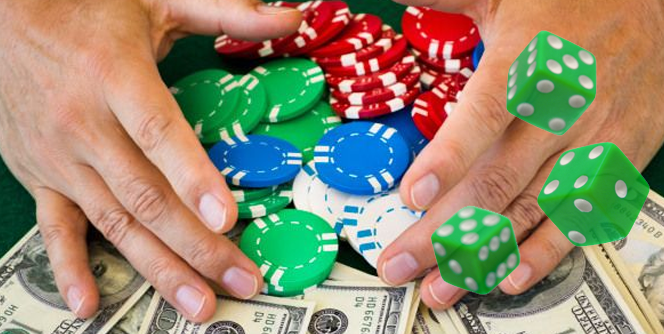Casino Bankroll Management
Having a good bankroll management strategy is crucial to having a good time in a casino. Learn some of our best tips to having a good gambling session! Online Casinos NJ online casinos SugarHouse Casino 888 Casino BetMGM Casino Unibet Casino PartyCasino Golden Nugget Casino. Casino Bankroll Management Decide on the budget and stick with it. Before you start playing, you need to have a good look at your overall financial status and see how much you can afford to play with. Bankroll Management is an Important Aspect for Winning Baccarat. Casino is a team of experienced professionals whose goal is to provide users with useful information from the world of gambling. With extensive knowledge and practical experience in this industry, we have focused on creating a quality resource for both beginners.
There are many different things that will impact how much you win when you play at an online casino, including, of course, luck! Aside from luck, the biggest factor governing your success at an online casino is bankroll management though, and this is something that every player should know about. Luckily for you, this page will tell you everything you need to know about bankroll management, ranging from the basic techniques needed to implement it, through to why it will make your online casino experience a more successful one.
If you've heard of bankroll management before, you might have turned your nose up and thought it sounded boring. Professional gamblers will all tell you that bankroll management is one of the main reasons for their success. So, why not spend just a few minutes reading about this important part of online gambling, and give yourself a much better chance of success when you gamble online?
Why You Need to Use Bankroll Management
Bankroll management is the process by which you only ever risk a set amount of your overall gambling funds, thus ensuring that you always have some money left over, which can be used to play another day. Imagine it using a simple 50/50 model, where you have a 50% chance of winning, and a 50% chance of losing. If you place your entire bankroll on the line on one turn of a card, you could conceivably lose everything. If you only put, for example, 5% of your bankroll on the line though, a loss wouldn't be disastrous. By spreading the risk, you take away much of the luck associated with gambling, and can instead let probability come into play.
The overall benefits of using bankroll management include:
- Being able to play for longer with less risk - by managing your spend to never exceed a certain percentage you can ensure that you always have money set aside to cover your losses while you wait for your winning streak
- You can make smarter gambling decisions - by keeping track of wins and losses by time of day, game type and even mood while playing, you can improve your odds of making better betting decisions
- You can plan your future easier - having a better idea of how much you can potentially make through gambling will allow you a better look at the big picture (whether this is moving on to higher stake games or changing to a casino with different offerings)
- Lower banking fees - You should always have money in the account which means fewer payment transactions as you will make fewer deposits
Bankroll Management: The Basics
Exercising bankroll management is simple: you just have to portion off a small slice of your bankroll, and then only play with that exact amount of money for your entire session. Many people think that around 10% is a good portion to risk, and we would have to agree. So, if you have a total of £1,000 to spend at an online casino, you should only ever play with £100 of that money. If you lose the entire amount, you should move away from the computer, and come back another day. When you do come back, you'll still have £900 left, so you can risk £90 of this money.
It's also possible to micro-manage your money when using bankroll management, by adapting the stakes you're playing at, depending on how much you've won or lost.
- • Let's take the £100 used in the previous example, and say that you're playing blackjack. Ideally, you'll have enough money to play at least 30 hands, so you should be playing at a table for stakes of around £3 per hand.
- Before you start, you should understand when to move down to lower stakes. For example, you could say that when your money reaches £50, you'll change tables and start playing for £1.50 a hand. Conversely, you could also say that if you manage to increase your money to £150, you'll move tables and start playing for £5 per hand.
- You can plan your future easier - having a better idea of how much you can potentially make through gambling will allow you a better look at the big picture (whether this is moving on to higher stake games or changing to a casino with different offerings)
- Doing so will allow you to minimise your losses, while also giving you the chance to capitalise when you're on a hot streak.
Initially deciding on your stakes is also an important part of bankroll management, and the number of spins, games or rounds you need to have in reserve really depends on the variance of a game. An example of a low variance game is blackjack, as the wins are regular, but not that large. Slots are an example of a higher variance game though, as the big wins don't come too often, however when they do arise, they could lead to a big boost to your account balance. Basically, the higher the variance, the more turns you'll need. So, you could play at stakes of around £3 when playing blackjack with a stack of £100, however you'll probably only want to spin the reels of a slot for around £1 per spin.
The final piece of information to mention about bankroll management is perhaps the most important though: you should never play with money you can't afford to lose. This is part bankroll management, and part taking care of your own personal finances. Gambling is fun, but it isn't fun when you can't pay your bills because you've lost money playing baccarat, roulette, or any other game. If you find that you're spending money you need, you have a gambling problem. If so, please look at our page on responsible gambling, to find out how you can get help.
Some Tips for Managing Your Bankroll
It's one thing reading through the above and understanding it, however it's another thing entirely implementing the strategy to your gameplay. So, here are some quick tips and hints about bankroll management, which should make it easier to implement this strategy:
Losing happens
Whether you gamble professionally or casually, when you gamble online, you will lose sometimes. Knowing how to manage your emotions when this happens is key to carrying on enjoying online gambling.
Don't get overexcited when winning
On the flip side of point one, while some excitement is understandable when you win, be careful to manage your emotions to avoid it affecting your next wager.
Fast profits rarely happen
Successful gambling requires players to build their bankrolls at a consistent rate: this means taking into account wins and losses and, given that casinos are around to make money, the process of building your bankroll can take quite a while. Do not get discouraged by a slow build-up, be prepared to play the long game for the big wins.
SET A BETTING LIMIT
While careful budgeting should be your primary way to manage your bankroll, setting a betting limit will ensure you don’t blow all your deposit should you start losing more than you are winning. Professionals typically set a betting limit equal to about 10% of their total bankroll. For example: if you deposit £1000 into your account, set your bet limit to £100. If you win your bankroll will increase but, if you aren’t so lucky, you will only be able to lose £100 of your deposit while the balance remains safe.
Keep a record
Keeping track of all your wins and losses on a daily basis will allow you to make smarter decisions. In addition to keeping you in the loop as to how much you can afford to lose, should you be on a losing streak, keeping records will also help in many other ways, such as seeing if you lose more when you're tired, or which games lead to the best returns.
Safeguard your deposit
One of the most important principles attached to bankroll management is protecting your deposit. Once you are have some money to your name, you may be tempted to place larger, riskier wagers. To avoid potentially losing all your hard earned profits, withdraw a portion of your winnings (usually slightly more than your starting deposit). In this way you will never lose money from gambling.
Casino Bonuses and Bankroll Management
There is no doubt that casino bonuses are a great way to increase your bankroll quickly, therefore you should always try to take advantage of the top bonuses available to you. To find the best bonuses around, simply read through the various casino reviews on this site, each of which will talk about the different bonuses an online casino offers.
It is important to remember this though: your bonus shouldn't skew your views on bankroll management. This is because bonuses have terms and conditions attached to them, meaning that they can't be withdrawn until certain conditions are met. So, separate your own money from the bonus money, and spend the bonus money first. Once you've met the rollover requirements, or used the bonus money, you can then get a real view on how healthy your account balance looks.

Similar Topics You'll Like
Roulette Bankroll Management
Quick Links
When To Cash In Your Chips
Ideal Roulette Bankroll Strategy
Using a Roulette Bankroll Calculator
Bankroll Tips when Gambling
Bankroll Management in Action
Roulette Bankroll FAQ
Managing your roulette bankroll is one of the most important aspects when gambling, although perhaps one of the least considered. A gambler who has an edge in their particular area might actually become a losing player, purely down to a lack of money management.
Roulette differs from some other forms of gambling in the fact that you’ll never have a positive winning expectation in the long run. In many ways, this makes bankroll management when betting on roulette even more important.
Why do You Need to Manage Your Roulette Bankroll?
When playing roulette your main aim is obviously to win money – along with enjoying the game. However, as any experienced roulette player knows, in the long term you’ll lose money, as the house edge can never actually be beaten.
From a roulette bankroll management plan, you’ll want to try and be in a position where the losses will never actually wipe you out, whilst giving yourself as many opportunities as possible to hit that purple patch where you’ll win some money. Doing this, you could find yourself in a position where you have upset the odds and actually make money from the game in the short-term.
Setting Up Your Roulette Bankroll
The first thing you should consider is the total amount of money you are willing to gamble at a roulette table. This amount should be the maximum you are actually willing to lose. This is now your bankroll. Deposit this amount to your casino of choice and you should aim to only use these funds at roulette. If you are tempted to play other casino games you should set up a separate gambling bankroll for these games.
Setting Up Your Staking Plan
Your aim should be to take a certain percentage of your plan to the table at any one time. This amount is up to you, as a suggestion, 10% might be a good figure. Having decided upon a percentage, you should stick to this and never vary from this amount.
When to Cash In Your Chips
Obviously, it is completely up to you when to leave the table and you’ll be able to do this at any time. However, you should try and have a plan at the table, and here we suggest a plan for both losing and winning sessions.
When You’re Losing
Having taken your percentage amount to the table, you’ll find many occasions when you’ll lose the whole amount. That is the nature of roulette – you’ll have sessions where everything goes wrong. This happens, but it’s what you do next that counts. Having lost that amount, quit. You’ve lost on the session, so get out, and don’t reload. This is the most dangerous point for any gambler, as the worst thing you can do is to try and chase your losses, and many gamblers will actually lose an entire bankroll by doing exactly this. If you do leave, you can start again the next time with a clear head and it will be much easier to stick to the plan the next time you play online roulette. We’d suggest leaving at least a day between sessions.
When You’re Winning
On a much happier note, you’ll also have sessions where you’ll win. This is also the nature of roulette – you’ll have sessions where everything goes right. Managing these winning sessions is just as important as managing the losing ones.


It is very easy to be sitting on a nice profit at the table, and then to lose it all on one spin of the wheel – and this can be heartbreaking if the amount is a sizable one.
We suggest setting a winning limit where you’ll walk away having hit this limit. Once again, this amount is up to you, but a good amount would be between 30% and 50% of your entire roulette bankroll. Having hit this amount, you’ll lock in the winnings and stop for the day, coming back for the next session with a bigger bankroll.
When It’s Time
There is another way to set a limit at the table – this being time. You might give yourself a set amount of time at the table, and if you have money at the table without hitting the upper limit, you’ll walk away anyway.
Ideal Roulette Bankroll Strategy
An ideal roulette bankroll strategy varies because betting patterns vary between players. An optimal roulette strategy depends on your bankroll. Because roulette has so many different wagers with a lot of volatility, the ideal roulette bankroll depends on the types of bets you make.
The optimal bankroll for the average roulette player is $60 to $100 in base bets if you’re placing outside bets. The ideal roulette bankroll for inside bets is $150 to $250 because you’ll have a lot more losing bets interspersed with big winning spins.
The optimal bankroll for the average roulette player is $60 to $100 in base bets if you’re placing outside bets. The ideal roulette bankroll for inside bets is $150 to $250 because you’ll have a lot more losing bets interspersed with big winning spins.
Strategy #1: Flat Betting
If you are risk-averse, then you’ll prefer flat betting. This is making the same size bet every hand. Remember that the odds of winning do not chance, but you win or lose in the same increments, making it easier to keep track of your bankroll.

Strategy #2: Progressive Bets
If you want small wins most of the time with the risk of one large loss, then you should try progressive bets like the Martingale, D’Alembert, or Fibonacci. Progressive betting techniques do not assure wins, the way some authors and bloggers might suggest because they do not beat the house edge or change the mathematics of the game. Martingale and Fibonacci bets lead to a lot of small winning sessions and one really bad losing session which mathematically equalizes the expected return.
Strategy #3: Doubling Down

If you are a thrill seeker who wants either dramatic big wins or big losses, then you should let bets ride after wins, hoping to continue the lucky streak. Letting it ride is essentially a double-or-nothing bet for the player on a hot streak. If you want a big win or no win at all, letting the bet ride is a way to achieve that goal.
Using a Roulette Bankroll Calculator
A roulette bankroll calculator is an online tool to help roulette gamblers determine how much to bet on each spin. This keeps you from betting too much on each spin and blowing your bankroll, or betting stakes too low and getting bored with the game.
How To Use a Bankroll Calculator
To use a bankroll calculator, input the size of your bankroll. The tool then calculates how much you should wager on each spin, often with three options:
- Safe/Conservative
Players use bankroll calculators in a variety of casino games, especially poker, but remember to use a dedicated roulette bankroll calculator when playing online. Each game has different dynamics, so the resource you use needs to be designed for European Roulette, American Roulette, and so on.
Bankroll Tips when Gambling
The term “money management” has a lot of different meanings, so you’ll come across a lot of bankroll tips when gambling. The roulette bankroll tips below are designed for those who want to manage their bankroll during a typical trip to the casino, which is broken into several gaming sessions.
Keep in mind: These gambling tips do not suggest ways to beat the casino, but methods to stretch your gambling funds and maximize the fun and excitement.
Roulette Bankroll Tip #1 – Setting a Goal
Step 1 – Set a Win Goal: A win goal is the number of winnings at which you decide it’s a winning session and you walk away from the table. Win goals help a player lock in their winnings. Enjoy your success a bit, walk away from the table, brag to your friends and family a bit, and save the bankroll for a later session.
Step 2 – End the Session: If you start with a $200 bankroll for a session, let’s say the win goal is $500. Once you get to $500 in winnings for that session, you walk away from the table – no matter what. If you’ve won $495, then it’s okay to make another bet.
Roulette Bankroll Tip #2 – Setting a Limit
Bankroll Management Calculator
Step 1 – Set a Loss Limit: A loss limit is the opposite of a win goal. It’s the number of losses that cause you to walk away from the roulette wheel. Loss limits keep a player from going on tilt and chasing their losses, a classic sign of compulsive gambling. Once again, you save your bankroll for a later roulette session.
Step 2 – Bankroll Percentage: In this case, a player calculates how much of their bankroll is too much to lose. If you start with $200 in your pocket, then perhaps the loss of 50% of your bankroll is too much. If you lose $100, you walk away from the roulette table. Most players set a loss limit of 20% to 25% of their total bankroll for any one session.
Bankroll Management Blackjack
Roulette Bankroll Management in Action
Here is an example of how bankroll management works.
A gambler considers they’d like to invest $500 at the roulette tables. They decide that they’ll take 10% to the table for every session and set a winning limit of 30%. They take $50 to the table the first time and unfortunately lose the whole amount. The person decides to play again two days later.
Their bankroll is now $450, so they take $45 (10%) to the table. This time the player has a purple patch and finds themselves with $135 in chips. This amount is exactly 30% of the bankroll, so the player stops. They walk away and put the $135 back into their roulette bankroll, which now sits at $540.
Roulette Bankroll FAQ
New roulette gamblers often have questions about managing their bankroll. Below are some of the frequently asked questions new roulette players ask, answered in Q&A form.
What is a Bankroll in Roulette Gambling?
A bankroll in roulette gambling is the amount of disposable income you have available for making bets. A bankroll is not your bank account; it isn’t even the amount of cash you have allotted for vacation. Instead, a roulette bankroll is the amount of cash you have earmarked for gambling, determined in a reasoned manner before you step on a casino floor.
What Percentage of Your Bankroll Should You Bet?
As a general rule, players do not wager more than 1% to 2% of their bankroll on a given spin of the roulette wheel. Never exceed 5% of your bankroll, even if you are a risk-taking gambler. Remember that you want to have multiple-hour sessions, so you want to nurse the bankroll for an entire session of bets.
Does a Welcome Bonus Affect a Roulette Bankroll?
Yes. If you accept an online deposit bonus from a casino website, then your player account is your effective bankroll. Calculate your roulette bankroll as all or part of your casino account, including the deposit bonus. Since you have to gamble the bonus cash to complete a wagering requirement, it is part of your bankroll.
How to be Good at Roulette
Being good at roulette requires a knowledge of the many different bets – inside and outside – on the table’s layout. Along with an understanding of the general odds and expected return of each bet. Roulette has no strategy to learn, so the key factor is learning how to place bets.
Which Roulette System Works Best?
No roulette system changes the expected return of the game, which is constant for most bets on the layout. The great fun of roulette is you don’t have to worry about complicated roulette strategies. Use roulette money management to make sensible bets and keep the excitement going for the longest time possible.
Does Bankroll Management Change from American to European Roulette?
Not really, but you should be aware that you can expect to lose more money with American Roulette than European Roulette. This means your loss limit might be different because you can expect to walk away from the table quicker.
What is a Safe Bet in Roulette?
Poker Tournament Bankroll Management Chart
The safest bet is an even-money bet when playing European Roulette or French Roulette –use the “en prison” or “la partage” rules. This is the safest bet because the house edge is only 1.35%. Even-money bets in roulette include the Red/Black bet, Even/Odd bet, or High/Low bet.
Gambling Bankroll Management
How Much is a Bankroll Supposed to Be?
Live Poker Bankroll Management
If you want to make $5 bets at the roulette wheel, then your bankroll should be $250 to $500. If you want to make $10 bets, then the bankroll needs to be $500 to $1000. If you’re a high roller and you want to make $100 bets, then a good roulette bankroll would be $10,000 to $20,000. A bankroll is supposed to be 50x to 100x your betting stake.